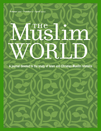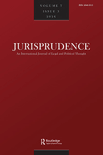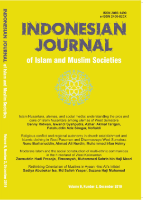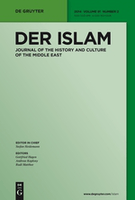
Islamic Law and Society
Scope & Guideline
Advancing Knowledge on Islamic Legal Traditions
Introduction
Aims and Scopes
- Islamic Jurisprudence and Legal Theory:
The journal focuses on the development, application, and interpretation of Islamic law (Shari'a), examining its theoretical foundations, methodologies, and various schools of thought. - Historical Contextualization:
Research often situates Islamic legal principles within historical frameworks, exploring how socio-political changes influence legal interpretations and practices over time. - Contemporary Legal Issues:
The journal addresses modern challenges and adaptations in Islamic law, discussing its relevance to contemporary issues such as human rights, governance, and secularism in Muslim contexts. - Interdisciplinary Approaches:
Contributions frequently employ methodologies from anthropology, sociology, and political science, creating a rich dialogue between Islamic law and broader societal dynamics. - Cultural and Regional Studies:
The journal encompasses studies on diverse cultural practices and regional variations in the application of Islamic law, highlighting its complexity across different Muslim communities.
Trending and Emerging
- Islamic Law and Modernity:
A notable increase in discussions surrounding the intersection of Islamic law and modernity, particularly how contemporary legal systems interact with traditional Islamic principles in diverse contexts. - Gender and Islamic Law:
Emerging scholarship increasingly addresses gender issues within Islamic law, exploring topics such as women’s rights, family law, and the implications of legal interpretations on gender dynamics. - Technology and Islamic Law:
There is a growing interest in the implications of technology, including blockchain and fintech, on Islamic legal principles, particularly concerning issues of compliance and ethical considerations. - Globalization and Islamic Law:
Research is increasingly focusing on the global implications of Islamic law, examining how globalization affects legal practices and the adaptation of Islamic legal frameworks in multicultural societies. - Environmental Law in Islamic Contexts:
Emerging themes related to environmental sustainability and Islamic law indicate a rising interest in how Islamic legal principles can contribute to contemporary environmental issues and debates.
Declining or Waning
- Classical Texts and Their Interpretations:
There seems to be a reduced emphasis on purely textual analyses of classical Islamic legal texts, as contemporary issues and practical applications take precedence in recent publications. - Theoretical Debates in Usul al-Fiqh:
Discussions centered on the foundational principles of Islamic jurisprudence, particularly Usul al-Fiqh, have become less frequent, indicating a shift towards applied studies and real-world implications. - Historical Legal Practices:
While historical studies remain important, there appears to be a diminishing focus on specific historical legal practices in favor of broader socio-legal analyses that connect past and present.
Similar Journals

MUSLIM WORLD
Connecting History, Culture, and Politics in the Muslim WorldThe Muslim World is a prestigious peer-reviewed journal published by Wiley, focusing on the intricate relationships and contributions of Islam within various domains of humanities and social sciences. With its roots tracing back to 1911 and converging until 2024, the journal encompasses an expansive historical perspective, enriching the understanding of Islamic culture, history, and its contemporary political significance. The journal holds a commendable impact in the field, as evidenced by its Q1 ranking in History and Religious Studies, and notable positions in Political Science and Sociology categories, signifying its substantial influence among researchers and academics. While operating under a subscription model, The Muslim World remains a crucial platform for fostering scholarly dialogue, promoting innovative research, and disseminating pivotal findings in its areas of study. With an ISSN of 0027-4909 and an E-ISSN of 1478-1913, it is committed to advancing knowledge within the framework of interdisciplinary studies, appealing to seasoned scholars and emerging researchers alike.

Islamiyyat-The International Journal of Islamic Studies
Fostering dialogue across cultures and disciplines.Islamiyyat-The International Journal of Islamic Studies is a prominent academic platform dedicated to advancing the scholarship of Islamic studies. Published by Penerbit Universiti Kebangsaan Malaysia, the journal emphasizes the significance of Islamic thought and practices within various cultural and sociopolitical contexts, fostering dialogue and understanding across disciplines. While it operates under an open access model, it remains committed to publishing high-quality, peer-reviewed research that addresses contemporary issues in Islamic studies, making it an essential resource for researchers, professionals, and students alike. This journal aspires to contribute meaningfully to the field by encouraging a diverse range of scholarly perspectives, thereby enhancing the global discourse surrounding Islam and its multifaceted narratives. For additional insights, submissions, and updates about upcoming issues, interested individuals are encouraged to visit the journal's webpage at Penerbit Universiti Kebangsaan Malaysia.

Journal of College of Sharia and Islamic Studies
Empowering Research in Islamic Studies Since 2005The Journal of College of Sharia and Islamic Studies, published by Qatar University, College of Sharia & Islamic Studies, is a premier academic platform dedicated to advancing the understanding and scholarly discourse in the field of Islamic studies and Sharia law. With an ISSN of 2305-5545 and an E-ISSN of 2523-1715, this open-access journal has been freely available since 2005, promoting accessibility to high-quality research for a global audience. Situated in Doha, Qatar, the journal serves as a pivotal resource for researchers, professionals, and students who seek to explore the complexities of Islamic jurisprudence, ethics, and philosophy. The journal's commitment to promoting rigorous scholarship is evidenced through its diverse articles, which not only address classical and contemporary issues in Islamic studies but also engage with interdisciplinary perspectives. As an essential resource within the academic community, it aims to foster dialogue and collaboration among scholars worldwide.

Al-Shajarah
Cultivating Knowledge in Cultural Studies and PhilosophyAl-Shajarah is an esteemed academic journal that serves as a vital platform for scholarly discourse in the fields of Cultural Studies, History, Philosophy, and Religious Studies. Published by the International Islamic University Malaysia and the International Institute of Islamic Thought and Civilization, the journal reflects a profound commitment to advancing understanding and dialogue surrounding Islamic thought and its place in modern society. With an ISSN of 1394-6870 and an evolving publication history since its convergence in 2011, Al-Shajarah offers valuable insights that cater to a broad array of readers, from seasoned researchers to emerging academics. The journal's rigorous peer-review process and commitment to cultural and religious scholarship are underscored by its categorization in the Q3 and Q4 quartiles in critical academic fields, and its Scopus rankings demonstrate its relevance within the global academic landscape. While open access is not currently available, Al-Shajarah remains a crucial resource for those seeking to enrich their understanding of Islamic civilizations and philosophy, providing access to pioneering research that shapes the conversation within these disciplines.

Jurisprudence-An International Journal of Legal and Political Thought
Navigating the Intersection of Law and SocietyJurisprudence: An International Journal of Legal and Political Thought, published by ROUTLEDGE JOURNALS, TAYLOR & FRANCIS LTD, serves as a vital platform for scholars and practitioners engaged in the ever-evolving discourse of legal and political theory. With its ISSN 2040-3313 and E-ISSN 2040-3321, this esteemed journal spans a converged period from 2015 to 2024, and has established itself in the Q2 quartile of the law category, ranking #359 out of 1025 and placing in the 65th percentile as per Scopus metrics in 2023. Based in the United Kingdom, this journal is dedicated to exploring the intricate relationships between law, political ideologies, and contemporary societal issues, thereby fostering interdisciplinary dialogue that is crucial for navigating today’s complex legal landscapes. Although it does not currently provide an open access option, Jurisprudence continues to attract a broad readership of researchers, professionals, and students seeking rigorous scholarship and practical insights into legal and political thought. With its strong impact within the field, the journal plays a significant role in shaping future discussions and advancements in legal studies.

Islamic Africa
Unveiling the Complexities of Islamic Traditions Across AfricaIslamic Africa, published by BRILL, is a vital academic journal that serves as a scholarly platform dedicated to the exploration of Islamic culture and its multifaceted interactions with the African continent. With a focus on cultural studies, history, literature and literary theory, religious studies, and the social sciences, this journal invites contributions that deepen our understanding of the historical and contemporary dynamics of Islam in Africa. Although categorized in various quartiles, it holds significance as a resource for researchers and students, particularly those engaged in areas ranked within the Q3 and Q4 categories. Since its inception, Islamic Africa has evolved through converged years, actively promoting interdisciplinary dialogue among scholars. With its commitment to high-quality research, this journal aims to illuminate the complexities of Islamic traditions and societies in Africa, fostering a deeper appreciation of their contributions to global cultural heritage.

International Journal of Islamic Thought
Navigating the Depths of Islamic Thought and TraditionInternational Journal of Islamic Thought is a leading scholarly publication, dedicated to advancing knowledge and understanding in the fields of Islamic studies. Published by UNIV KEBANGSAAN MALAYSIA, FAC SCIENCE & TECHNOLOGY, this journal is positioned as an essential resource for researchers, professionals, and students alike, striving to explore and disseminate contemporary thoughts and interpretations within the Islamic intellectual tradition. With an impact factor indicative of its quality—ranking Q2 in Arts and Humanities and Q3 in Social Sciences as of 2023—the journal provides a robust platform for interdisciplinary discourse. Since its inception, the journal has embraced an open access model, ensuring that research is readily available to a global audience, thereby fostering further inquiry and collaboration. Hailing from Malaysia, the journal's commitment to contributing to both the local and international scholarly communities is underscored by its impressive standing in the Scopus rankings, reflecting its growing influence and reach in the academic landscape.

Indonesian Journal of Islam and Muslim Societies
Empowering voices in the fields of Islamic studies and social sciences.Indonesian Journal of Islam and Muslim Societies (IJIMS) is a leading platform for scholarly discourse in the fields of Islamic studies and social sciences, published by INST AGAMA ISLAM NEGERI-IAIN SALATIGA. Since its establishment in 2011, IJIMS has been dedicated to advancing the understanding of Islamic culture, society, and politics, with an impressive impact reflected in its Q1 ranking in Religious Studies and Q2 in Sociology and Political Science as of 2023. The journal not only ranks among the top in the Scopus database, occupying the 19th position in the Arts and Humanities—Religious Studies category, but it also offers open access to its content, making it readily available to a global audience. This commitment to accessibility ensures that researchers, students, and professionals can engage with high-quality research that informs and shapes contemporary dialogue on Islam and Muslim societies. With a convergence of rich academic contributions through to 2024, IJIMS stands as a vital resource for those looking to explore the complexities of Islam in a modern context.

ISLAM-ZEITSCHRIFT FUR GESCHICHTE UND KULTUR DES ISLAMISCHEN ORIENTS
Navigating the Complexities of Islamic Culture and HistoryISLAM-ZEITSCHRIFT FUR GESCHICHTE UND KULTUR DES ISLAMISCHEN ORIENTS, with ISSN 0021-1818 and E-ISSN 1613-0928, is a prestigious academic journal published by Walter de Gruyter GmbH based in Germany. With a rich history dating back to 1910 and a dedicated focus on the cultural and historical insights of the Islamic Orient, this journal serves as a vital platform for scholars around the globe. It is recognized in the Q2 quartile in both Cultural Studies and History, reflecting its high-impact contributions to the field. The journal features rigorous peer-reviewed articles, making significant advancements in understanding Islamic culture and history. Notably, it holds commendable Scopus Ranks, placing it in the top 65th percentile for History and the 53rd percentile for Cultural Studies. Researchers, professionals, and students interested in the complexities of Islamic heritage will find this journal indispensable for its depth of analysis and breadth of scholarship. While it currently does not offer Open Access, its comprehensive resources are crucial for academic research in these historically rich fields.

Bilimname
Empowering Scholars to Share Groundbreaking IdeasBilimname is a distinguished academic journal published by the ILAHIYAT BILIMLERI ARASTIRMA VAKFI, dedicated to advancing knowledge in the fields of Islamic studies, theology, and social sciences. With its E-ISSN: 2148-5860, this open-access journal provides a platform for researchers, scholars, and students alike to publish and share innovative ideas and groundbreaking research. While specific metrics such as H-Index and Scopus ranks are currently unavailable, Bilimname continues to foster academic discourse and engagement, making it an essential resource for individuals keen on exploring contemporary issues within its scope. Located in Kayseri, Turkey, the journal aims to bridge theoretical insights with practical applications, thereby contributing significantly to the academic community and shaping future research in relevant disciplines.